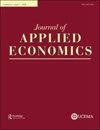探索创新导向股票市场中的羊群行为:来自创业板的证据
IF 2
4区 经济学
Q3 ECONOMICS
引用次数: 3
摘要
摘要我们采用横截面绝对偏差模型(CSAD),以创业板2015-2019年的股票为基础,检验了创业板的羊群行为。我们的研究结果表明,羊群行为普遍存在,这意味着这种行为在一个以成长型创新企业为主题、由个人投资者而非机构投资者主导的相对较新的股票市场中普遍存在。此外,我们发现,在市场下跌的时期,羊群行为往往比市场上涨的时期更严重。我们解释说,个人投资者的几个不同属性导致他们在下跌的市场中抛售,这与行为金融中“持有失败者的处置效应”的标准解释相反。我们为一个相对较新的创新型股票市场的羊群行为文献以及我们对投资者环境的理解做出了贡献,这可能会推翻经常被引用的处置效应。本文章由计算机程序翻译,如有差异,请以英文原文为准。
Exploring herding behavior in an innovative-oriented stock market: evidence from ChiNext
ABSTRACT We adopt the cross-sectional absolute deviation model (CSAD) to test the herding behavior of ChiNext, a decade-old NASDAQ-style stock market in China, based on its stocks from 2015-2019. Our findings show that the herding behavior is prevalent, implying that such behavior is widespread in a relatively new stock market themed with growth-oriented innovative enterprises and dominated by individual investors instead of institutional investors. Moreover, we find that herding tends to be more severe during the periods of falling market than rising market. We explain that several distinct attributes of the individual investors cause them to sell during the falling market, an act contrary to the standard account of the “disposition effect of holding the losers” in behavioral finance. We contribute to the herding behavior literature for a relatively new innovative-oriented stock market as well as our understanding of the investors’ circumstances, which may disprove the often-quoted disposition effect.
求助全文
通过发布文献求助,成功后即可免费获取论文全文。
去求助
来源期刊

Journal of Applied Economics
ECONOMICS-
CiteScore
3.00
自引率
0.00%
发文量
57
审稿时长
40 weeks
期刊介绍:
The Journal of Applied Economics publishes papers which make a significant and original contribution to applied issues in micro and macroeconomics. The primary criteria for selecting papers are quality and importance for the field. Papers based on a meaningful and well-motivated research problem that make a concrete contribution to empirical economics or applied theory, in any of its fields, are especially encouraged. The wide variety of topics that are covered in the Journal of Applied Economics include: -Industrial Organization -International Economics -Labour Economics -Finance -Money and Banking -Growth -Public Finance -Political Economy -Law and Economics -Environmental Economics
 求助内容:
求助内容: 应助结果提醒方式:
应助结果提醒方式:


